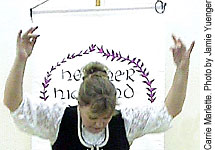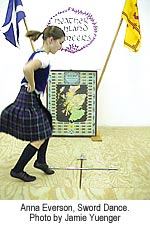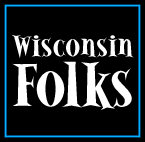Home | Search | The Artists | Teaching | Hiring | About This Site | Contact Us
Heather Highland
Dancers’ Main Page

Heather Highland
Dancers’ Art Form

Scottish Highland Dance
Madison, WI
If you love to hop, you’ll love Highland dance!
To know what Highland dance is like, “Hop up and down on one foot for a minute and a half without letting your heel touch the floor.” That’s how Susan Jeffrey describes the style. Susan is the
director of the Heather Highland Dancers. She’s been dancing Highland dance since she was eight years old, for about twenty years!
Hopping is a characteristic of Scottish Highland dance. Another characteristic is precision. All the dances have very organized choreography. The dancers have set movements and travel to specific spots on the dance floor.
Solo dancing is another characteristic of Highland dance. Many dances are done by just one person. There is no couple dancing and dancers rarely touch.
 Highland Dancers hold their hands in a characteristic pose. They
extend all their fingers except the thumb and middle finger. The thumb touches the first joint of the middle finger. Try it it yourself! If the dancers’ hands aren’t in this pose, then they’re
in fists. Highland dancers hold their fists either at their sides or on their hips.
Highland Dancers hold their hands in a characteristic pose. They
extend all their fingers except the thumb and middle finger. The thumb touches the first joint of the middle finger. Try it it yourself! If the dancers’ hands aren’t in this pose, then they’re
in fists. Highland dancers hold their fists either at their sides or on their hips.
History in Dance
There are many Highland dances. Some tell stories and some tell Scottish history. Three favorite dances are:
- The Highland Fling – The Highland Fling is danced in only one spot. Long ago, dancers used to perform it on top of a targe (shield). The targe had a large spike in the middle so it was important to stay in a spot away from the spike! (Other people think the Highland Fling came from another dance, the Stathspey.)
 The Sword Dance – You already know a little about this dance!
It started when a man named Malcolm Canmore first danced over his swords after a battle near Dunsinane, Scotland. This is a vigorous
dance usually performed for two minutes at a time.
The Sword Dance – You already know a little about this dance!
It started when a man named Malcolm Canmore first danced over his swords after a battle near Dunsinane, Scotland. This is a vigorous
dance usually performed for two minutes at a time.
- The Seann Triubhas – ‘Seann Triubhas’ means ‘old trousers’ in Gaelic. This dance celebrates the end of the Act of Proscription. The Act forced Scottish men to wear trousers. No one could wear important regional clothes like the kilt and tartan. When the Act was repealed, Scots could wear kilts again.

For Educators:
Home | Search | The Artists | Teaching | Hiring | About This Site | Contact Us